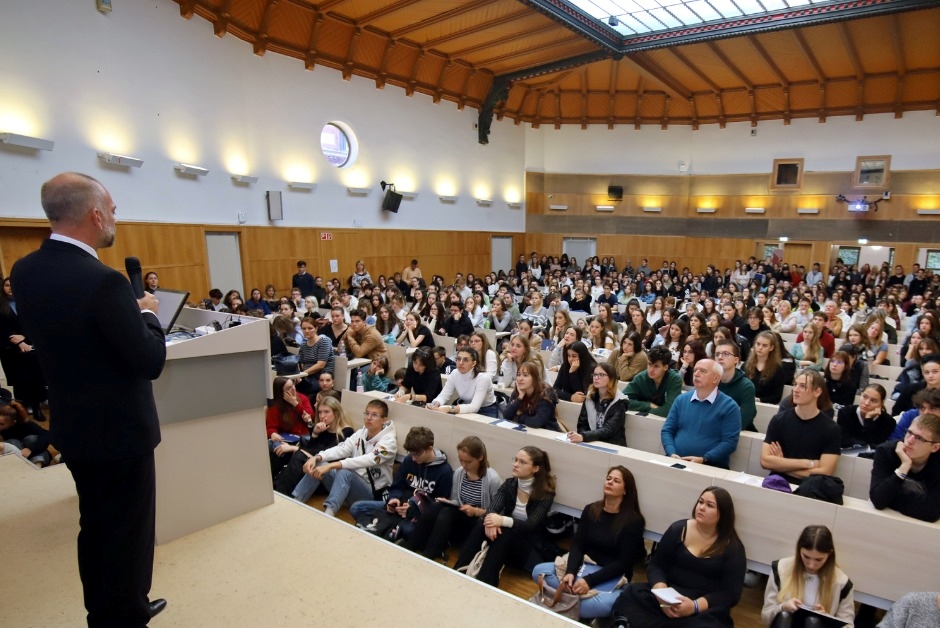
If the European programs were to be relaunched, the Hungarian alternative scholarship program would remain, he stressed.Continue reading

Hungarian universities are under serious pressure from Brussels, unlawfully excluding Hungarian researchers and students from various international programs, the Minister of Culture and Innovation told Magyar Nemzet.
Balázs Hankó said in the interview that Hungarian innovation and technological developments are becoming increasingly powerful. “We have doubled the number of young doctoral students in five years. In the last ten years, we have more than doubled the number of researchers and developers per million inhabitants,” he underlined. At the same time, research and innovation funding has tripled, with HUF 1,040 billion (EUR 2.5 billion) now being spent in this area, he added. The aim is that by 2030, one in two Hungarian businesses should take advantage of innovation opportunities, and Hungary should be among the ten most innovative countries in Europe, which is also the aim of the tenders supporting the SME sector.
Speaking about the Pannonia program that was established to replace Erasmus, he said it offered higher grants than Erasmus and was much better adapted to students’ needs. The program is growing in popularity, with 3,000 young people going on a study trip abroad this week. The minister pointed out that
Brussels was committing an infringement of the Horizon program and would interfere with Hungarian sovereignty.
Hankó said that it was time for Hungary to consider challenging the recent discriminatory decisions of Brussels in the European Court of Justice. In Hungary, the Horizon program has been replaced by the HU-rizont program, under which 30 universities have received a total of HUF 12 billion (EUR 29.3 million) in research funding. Hungarian universities are connecting the East with the West, thus ensuring the precondition for economic neutrality, namely research neutrality.
Last autumn, Hungary adopted an amendment with the aim of enhancing university governance transparency and independence by introducing key changes. Trusteeships are capped at six years, high-ranking government officials are barred from serving on boards during their term, a one-year cooling-off period applies for former officials, and the State Audit Office will oversee conflict-of-interest compliance. However, the European Commission decided last December that the Hungarian model-changing universities will still not be able to participate in the Erasmus+ and Horizon programs despite the reform package presented by the government at the beginning of December. In a statement, the commission chaired by Ursula von der Leyen announced that the reform presented “is not sufficient to address risks of conflicts of interests” in the boards of the university foundations’ public interest trusts.
Regarding the workers’ loan, the minister said that the first weeks’ experience had shown that it was a success, with more than 2,000 applications, averaging HUF 3.7-3.8 million (EUR 9,000-9,290). On family policy, he highlighted that this year, the government will spend HUF 3,754 billion (EUR 9.1 billion) on family support, HUF 447 billion (EUR 1.09 billion) more than last year. Tax relief and other benefits will leave HUF 754 billion (EUR 1.8 billion) for families, and the family tax allowance will be doubled.
Referring to demographic trends, he pointed out that they have been negatively affected by a number of external factors since the 2020s. In addition, it should be noted that the number of children in Europe has fallen sharply, while the decline in Hungary is half as high.
Analyzing the cultural situation, he recalled that
one of the most successful programs in the international arena last year was the Hungarian-Turkish cultural year, which organized 170 programs and reached millions of Turkish visitors.
This year it will be continued with an innovation season and the Hungarian-Serbian cultural season will start in the autumn. The aim is to give Hungarian culture a stronger presence in Central Europe and the Western Balkans, he emphasized.
Hankó argued that preventing the loss of identity is everyone’s task, and to this end the government has developed a cultural program system for all ages that is almost unique in Europe and the world, and spends twice the EU average on supporting Hungarian culture. He emphasized that “Hungarian culture is our national pride, it connects Hungarians across borders, throughout the Carpathian Basin and worldwide. That is why our task is not only to live and breathe Hungarian culture, but also to present it in the international arena. Especially now, when Europe is losing its identity. At such times, it is even more important for a nation to proudly display its own culture, traditions, customs, and values.”
Via Magyar Nemzet, Featured photo via Pixabay